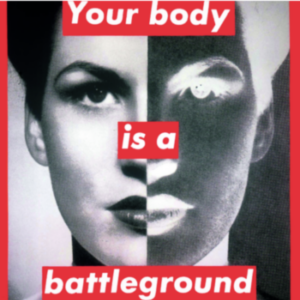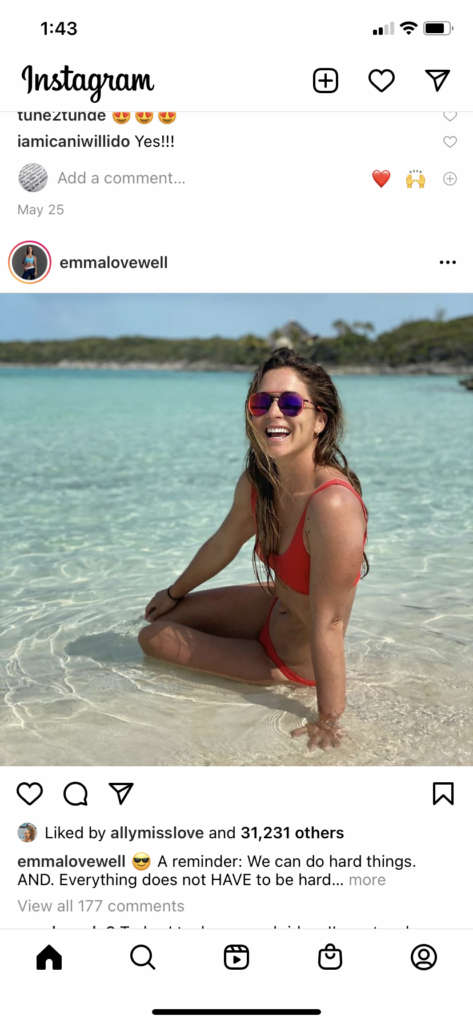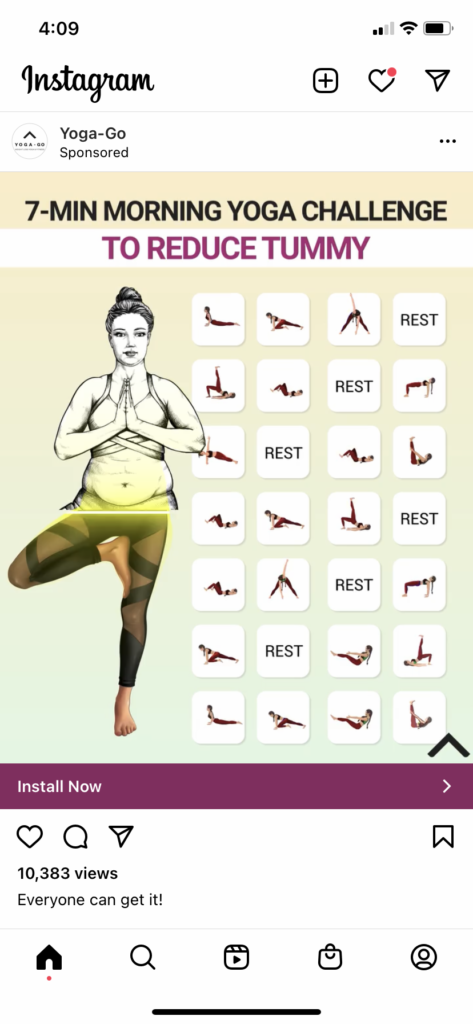Several of our readings discussed the concept of the gaze: the colonial gaze evaluating black women’s bodies, the male gaze evaluating female hunger, even the elusive self-gaze that we only find in reflection via mirror or screen. Our readings also suggested layers of that gaze that peer beyond our bodies into our datafied selves, seeing representations of who we are in hospital monitors, friend networks on social media, even our locations. Heading to Instagram, I saw the advertiser’s gaze at work. I don’t have a single selfie posted, yet the advertisers are already picturing me. Because I follow two Peloton instructors (who are actually friends of friends of mine) and because Instagram uses Facebook info, such as age, to build their picture of me, the ads prey on my perceived vulnerability: a desire to look like those I follow. The image of Emma Lovewell gets read as who I want to be. The ad tries to get me to believe that Yoga-Go can get me there. (Note that the ad is dynamic, as the “chubby” line drawing gets swiped over to reveal a thinner, “fitter,” fully realized woman in color.)
Unruly Bodies
A MALS Summer Course






I find this marketing tactic – exploiting people’s (women’s, mainly) bodily insecurities to get potential customers to part with their money – really depressing, particularly because I thought many advertisers had finally realized it often has the opposite of the desired effect and generates a backlash (à la “are you beach ready” ad from 2015). While I think some of the body positivity marketing campaigns also raise issues (this piece from one of my favorite writers, Amanda Mull, touches on a few of those points: https://www.vox.com/2018/6/5/17236212/body-positivity-scam-dove-campaign-ads), the shift towards this type of marketing was still something of a refreshing departure from the types of ads we saw growing up, which often left you feeling insecure and desperate to conform to a certain image. I imagine the granular targeting available on social media, which you mention, has probably helped advertisers refine their approach to avoid some of the backlash they face when they plaster these ads in very public places like tube and subway stations.
Every time I scroll through social media I see more and more of these targeted ads. I think advertisers and Instagram are getting smarter and now show me ads with a photo that looks just like something I would see posted by an account that I do follow. The hope is that I’ll interact/like/share the ad as if it’s just another post I’d see on my feed. Which then earns them money and visibility. Lots of issues here.
Instagram was created as a platform for people to share images of people, places, and things, but over the past couple of years I’ve noticed an overwhelming increase in posts that feature or talk about bodies. Whether it’s in a positive or negative light, the body continues to dominate on Instagram. We see accounts with slim models and influencers trying to sell us something and get angry that we don’t look like that idea of perfection. Then we see a body positivity post with messages of support and “we’re all beautiful the way we are” which feel phony and not at all genuine. It’s a cycle where we’re constantly thinking about our bodies—that “uncool obsessiveness” in the Bordo reading—but hidden behind the coolness of social media. I’m really not at all surprised to hear that the number of young people with unhealthy relationships to food and their bodies is on the rise.
This topic is so interesting to me. Marketing campaigns really do take over movements that might have had a chance to make people feel better about themselves. I looked up the hashtag #bodypositivity on Instagram, and it is close to getting 8 million posts. Although many posts are of people who are just posing, feeling good, and appreciating their bodies, the message is, in a great part, distorted. 1. I see many posts of before and after weight loss. 2. I saw many people who have six packs and very toned bodies, and 3, there are many posts about promoting workout plans, diet plans, and food. For 1 and 2, although I agree that some people might actually be proudly showing their progress or their perfect bodies, which is great, this might actually send a wrong message to some people. If I am looking for #bosypositivity photos on IG hoping to feel better, I might feel worse because now I realize that I need a six-pack to be happy with my body, or even I need to go through a weight loss transformation.
Looking at the yoga ad, the first thing that came to my mind was the if the “thinner, “fitter,” fully realized woman in color” was smiling, my assumption–yes. The idea of happiness and a smaller tummy being linked. It is also worth noting, that nowhere on the ad do they mention health. The image of the body, and specifically their image of a woman’s body, is what is paramount to the advertiser and they assume, to the viewer. The caption “Everyone can get it”, is also very misleading, the shape of a women’s body is not a singular shape that is ether enlarged or shrunk, varies by proportions. The notion that by doing yoga everyone can get to shape of the advertised body image is misnomer that continues to promote this often unattainable idealized body.
Hi Kelly, Yes, these two images do work together to convince women that they need to change their body so that it could be more ideal. What I find disconcerting about these posts, and many others like it, is that it focuses on women who wear as few clothes as possible. Does it promote the idea that women need to be near-naked to be perceived as attractive? The constant portrayal of women without clothing can be frustrating for girls who are not comfortable showing off that much skin or who have stylish full-coverage clothes or who have skin scars.
There’s a site, or at least there used to be, where you can “look behind the gaze” to unearth the key demographic categories that advertisers think you fit and what some of your top interests are to make their ads more relevant to you. I am waiting for the day when we’ll all be fitted with wearables and the ads will hover in 3-D in our eyesight like in the section of Minority Report where Tom Cruise is running through the mall. And they’ll be whispering to me that I should buy those sneakers that I was looking at an hour ago so that my body can be “beach ready.”
I used to work in digital marketing, and the specificity of the data about our “targets” (we really called them that) available to us was beyond creepy. Needless to say, they didn’t know we had it. All for the purpose of manipulating people at their most vulnerable.
Social media was created as technology with the potential to liberate us from the pitfalls of traditional media. Instead, it has further honed all of old media’s predations, mining our personal psychology for money rather than mass dreams.
Technology is celebrated for its own sake. But without values, technology is just an out-of-control cancer, approaching the “instrumental reason” that some scholars say is at the core of fascism.
I think a keyword is anxiety because advertising uses it to create reactions and produce non-existent identities. And there is an abuse of an idea of happiness that most people are looking for, that is why the author refers to the fact that people betray their own body. Although this idea also seemed a bit conflictive to me, why would it be a betrayal of our body and what not, for example doing a labia surgery would be a betrayal, but modifying the body to exchange gender, wouldn’t it be a betrayal? What is the measure?
Ah yes, another reminder of how insidiously creepy social media advertising is. I often try and forget about it, because while it is deeply disturbing there’s not much I can do about it, but that does not make it any less real. With content like the images in this post, I wonder how much targeted advertising contributes to self-making, and how is it able to influence or inspire the way that we see ourselves.
These algorithms read your information from all pagers, from what pages you search, to what you search on amazon. Then they flash advertisements across all pages of other networks, apps, and games one has on their devise or computer. These algorithms are created by smart people that understand how to trap people in their advertisements. They believe people want to be like the person in the picture, and for a few, it may be true. My mother jokes that when she buys something on the computer, she receives emails and flashes of advertisements on different websites after she bought the item on similar items. She says they are foolish to think that I need to rebuy this item. These algorithms are very flawed and out to trap the valuable.